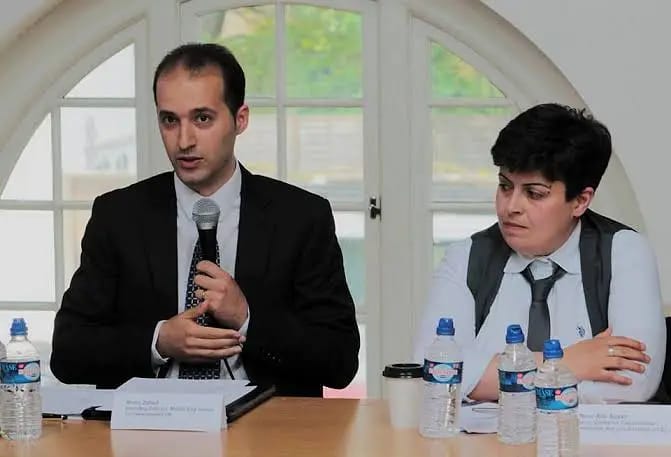Trending Now
- IPL 2024 begins with a bang. First contest between CSK and RCB.
- Election commission allots mike symbol to Naam Thamizhar Katchi
- AIADMK promises to urge for AIIMS in Coimbatore, in its election manifesto.
- Ponmudi becomes higher education minister.
Coimbatore
“There will be war, but not in the initial stages”: Mosa Zahed
![]() January 5, 2020
January 5, 2020
International relations expert of Iranian origian Mosa Zahed speaks to The Lede about the killing of Qassem Soleimani and its repercussions
Mosa Zahed is the Executive Director of the Middle East Forum for Development, an international initiative which aims to promote human rights and development in the Middle East.
In an email interview with The Lede, Zahed describes who slain Quds Force chief Qassem Soleimani was and how his death will impact world politics.
Here is the interview.
1. How do you view the killing of Qassem Suleimani by the United States?
A: The Iranian regime has clearly intensified its malign activities regionally and internationally, taking into consideration some recent developments starting with the oil tanker attacks in the past year aimed to disrupt oil shipments through the strait, Saudi Aramco attacks, its support for proxy forces that continue to sow death and destruction in Iraq, Syria, Yemen and Lebanon, the terror plots on European soil aimed to eliminate Iranian dissidents and domestically the bloody crackdown of protesters in recent weeks who called for regime change which resulted in the deaths of over 1500 people.
These are desperate measures of a regime on the verge of collapse and they have gradually isolated Iran even more internationally. The assassination of Qassem Soleimani is a game changer that will eventually lead to a unified approach by the international community towards the mullahs’ regime’s belligerence and thus accelerate its collapse.
2. India has had uneasy ties with Iran and in the recent past has attempted to evade US sanctions and continue to buy crude oil from Iran. While it is not a close and comfortable relationship, it is definitely one of mutual respect. How will the escalating tensions affect Iran-India ties?
A: The Iranian regime will, at some point, strike back and this will result in the intensification of more pressure from Washington on Tehran. Considering the existing international consensus regarding Tehran’s regional belligerence posing a significant challenge to global peace and security, the Iranian regime’s next move will enable Washington to solidify a unified international front to counter Tehran’s hostilities.
In such an environment, the US would expect from its allies to follow suit with its approach which inevitably will have consequences on Iran-India ties as well.
3. Qassem Soleimani appears to have been quite a dark, almost extra-judicial character. But he seems to have been a brilliant strategist as well. Would you be able to explain what kind of a person he was, what he did and why his death is of such significance to the Iranian regime?
A: As an Iranian I find it rather shocking how some news outlets glorify Qassem Soleimani and dub him a “national hero”. The truth is far from it.
Soleimani and the Islamic Revolutionary Guards Corps (IRGC) are heavily despised inside Iran. At home, the mullahs’ regime utilises the IRGC to brutally repress dissent against the theocracy; abroad, it relies on the Quds Force, the paramilitary arm of the IRGC, to export its brand of Islamic fundamentalism and to facilitate terrorist activities.
The people of Iran have on multiple occasions during public protests condemned the mullahs’ use of the country’s revenues for financing terrorism abroad via the IRGC’s Quds Force.
As the leader of the Quds Force, Qassem Soleimani expanded Ayotallah Khamenei’s clout in the Middle East and played an instrumental role in preventing the fall of the Bashar Assad regime in Syria and in supporting the formation of pro-Iranian terrorist groups in Iraq.
These Iran-backed Shia militias are now cracking down on Iraqi protesters who have risen up against the political establishment and demand the eviction of Iran-backed forces from Iraq.
Soleimani was responsible for the massacre of thousands of people across the Middle East and was the regime’s highest-ranking General second-in-command after the Supreme Leader.
His death is therefore a huge blow to Tehran so the regime will have to respond and the confrontation will not end here.
4. What do you foresee happening next? The Iranian Supreme Leader has vowed “harsh revenge”. Will there be war or would the backlash be more subtle? Also which countries/governments would back Iran and which would remain neutral at least as far as West Asia is concerned?
A: There will be war, but not in the initial stages. In such event, Western nations, Arab nations – including Iraq – and Israel will support the US.
Russia, China and India will remain neutral and Turkey will condemn the war. Considering the significant effects of sanctions on Iran’s economy, the people’s discontent with the theocratic establishment as seen during the recent nationwide protests, and the geopolitical developments, especially the ongoing protests in Lebanon and Iraq against the mullahs regime’s meddling in their internal affairs, Tehran will certainly not be in a position to sustain a full-blown war against the US.
The regime will be brought down by the people who will rise up.
5. Do you believe that US President Trump has made a mistake by this act?
A: I agree with President Trump that Qassem Soleimani should have been taken out many years ago.
By allowing the Commander of the Quds Force to roam freely across the Middle East to engage in terrorist activities, more lives were lost and it jeopardised regional peace and security.























